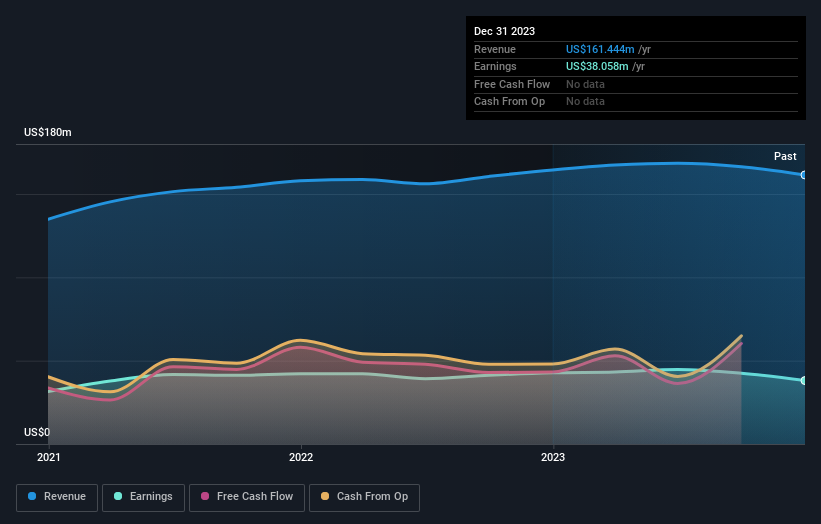Individual investors account for 45% of Enterprise Bancorp, Inc.'s (NASDAQ:EBTC) ownership, while institutions account for 30%
Key Insights
Enterprise Bancorp's significant individual investors ownership suggests that the key decisions are influenced by shareholders from the larger public
47% of the business is held by the top 25 shareholders
To get a sense of who is truly in control of Enterprise Bancorp, Inc. (NASDAQ:EBTC), it is important to understand the ownership structure of the business. We can see that individual investors own the lion's share in the company with 45% ownership. Put another way, the group faces the maximum upside potential (or downside risk).
And institutions on the other hand have a 30% ownership in the company. Institutions will often hold stock in bigger companies, and we expect to see insiders owning a noticeable percentage of the smaller ones.
In the chart below, we zoom in on the different ownership groups of Enterprise Bancorp.
Check out our latest analysis for Enterprise Bancorp
What Does The Institutional Ownership Tell Us About Enterprise Bancorp?
Institutional investors commonly compare their own returns to the returns of a commonly followed index. So they generally do consider buying larger companies that are included in the relevant benchmark index.
As you can see, institutional investors have a fair amount of stake in Enterprise Bancorp. This implies the analysts working for those institutions have looked at the stock and they like it. But just like anyone else, they could be wrong. When multiple institutions own a stock, there's always a risk that they are in a 'crowded trade'. When such a trade goes wrong, multiple parties may compete to sell stock fast. This risk is higher in a company without a history of growth. You can see Enterprise Bancorp's historic earnings and revenue below, but keep in mind there's always more to the story.
Enterprise Bancorp is not owned by hedge funds. Looking at our data, we can see that the largest shareholder is Kenneth Ansin with 9.8% of shares outstanding. BlackRock, Inc. is the second largest shareholder owning 6.5% of common stock, and The Vanguard Group, Inc. holds about 3.5% of the company stock. In addition, we found that John Clancy, the CEO has 1.5% of the shares allocated to their name.
Our studies suggest that the top 25 shareholders collectively control less than half of the company's shares, meaning that the company's shares are widely disseminated and there is no dominant shareholder.
Researching institutional ownership is a good way to gauge and filter a stock's expected performance. The same can be achieved by studying analyst sentiments. Our information suggests that there isn't any analyst coverage of the stock, so it is probably little known.
Insider Ownership Of Enterprise Bancorp
The definition of company insiders can be subjective and does vary between jurisdictions. Our data reflects individual insiders, capturing board members at the very least. The company management answer to the board and the latter should represent the interests of shareholders. Notably, sometimes top-level managers are on the board themselves.
Most consider insider ownership a positive because it can indicate the board is well aligned with other shareholders. However, on some occasions too much power is concentrated within this group.
Our information suggests that insiders maintain a significant holding in Enterprise Bancorp, Inc.. It has a market capitalization of just US$333m, and insiders have US$83m worth of shares in their own names. This may suggest that the founders still own a lot of shares. You can click here to see if they have been buying or selling.
General Public Ownership
The general public-- including retail investors -- own 45% stake in the company, and hence can't easily be ignored. This size of ownership, while considerable, may not be enough to change company policy if the decision is not in sync with other large shareholders.
Next Steps:
I find it very interesting to look at who exactly owns a company. But to truly gain insight, we need to consider other information, too.
I always like to check for a history of revenue growth. You can too, by accessing this free chart of historic revenue and earnings in this detailed graph.
Of course, you might find a fantastic investment by looking elsewhere. So take a peek at this free list of interesting companies.
NB: Figures in this article are calculated using data from the last twelve months, which refer to the 12-month period ending on the last date of the month the financial statement is dated. This may not be consistent with full year annual report figures.
Have feedback on this article? Concerned about the content? Get in touch with us directly. Alternatively, email editorial-team (at) simplywallst.com.
This article by Simply Wall St is general in nature. We provide commentary based on historical data and analyst forecasts only using an unbiased methodology and our articles are not intended to be financial advice. It does not constitute a recommendation to buy or sell any stock, and does not take account of your objectives, or your financial situation. We aim to bring you long-term focused analysis driven by fundamental data. Note that our analysis may not factor in the latest price-sensitive company announcements or qualitative material. Simply Wall St has no position in any stocks mentioned.

 Yahoo Finance
Yahoo Finance 

